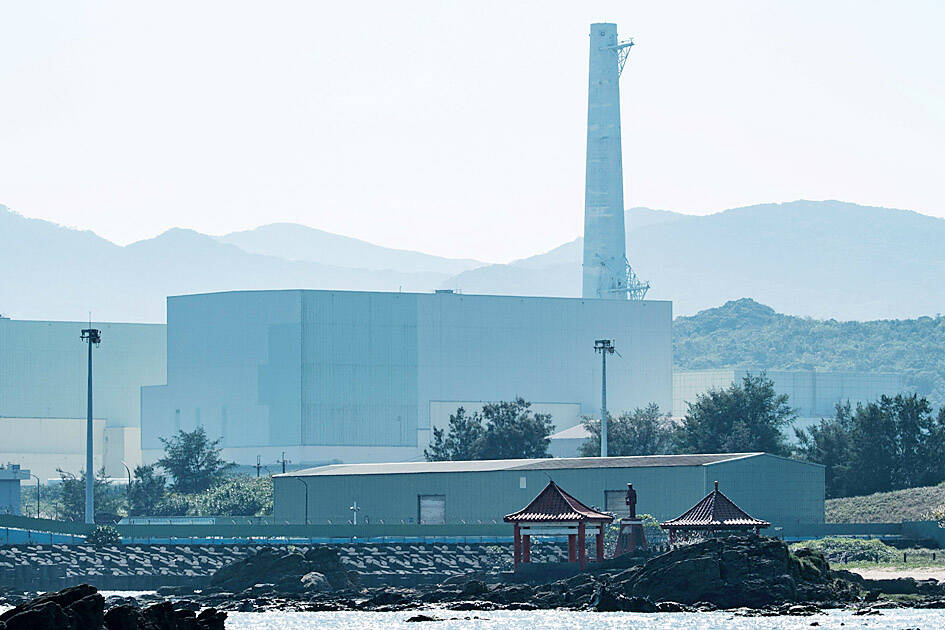GE Vernova Inc, one of the world’s biggest gas turbine makers, says Taiwan is its fastest-growing Asian market, as the nation’s plan to phase out nuclear energy forces it to rely more on fossil fuels to power its world-leading chipmaking industry.
Turning off nuclear in Taiwan “is leading to a steeper curve of replacement demand,” and “gas is the most applicable replacement to nuclear,” GE Vernova chief executive officer Scott Strazik said.
“We have a lot of opportunity in places like Taiwan that see a lot of electricity growth with chip demands in front of it,” he said in an interview in Singapore.

Photo: Yasuyoshi Chiba, AFP
Taiwan — home to the world’s biggest chipmaker, Taiwan Semiconductor Manufacturing Co (台積電) — plans to phase out its last nuclear reactor by May even as power demand is expected to rise in the coming decades. Efforts to develop offshore wind have also faced challenges as rising costs and worsening delays plague the industry, leaving the nation with fewer low-carbon energy options.
However, Taiwan remains open to using new nuclear technology, Premier Cho Jung-tai (卓榮泰) said in an interview with Bloomberg News late last year. As long as there is a consensus on safety and good waste management, Taiwan can have a public discussion about the use of nuclear power, he said.
For GE Vernova, which also makes small modular nuclear reactors, the global interest in nuclear energy represents an opportunity down the line, Strazik said.
“There’s been an incredible level of enthusiasm for new nuclear, but it’s going to take some time to materialize,” he said. “We’re very motivated with our small modular reactor technology that will be commissioned in Canada in 2029 with the first plan, and then we see it playing a more material role in the rest of the world.”
In Southeast Asia, GE Vernova, which was spun off from General Electric Co last year, sees opportunities in nations such as Malaysia and Indonesia, where gas demand is growing as more data centers are sprouting and the need for electricity is rising.

Sweeping policy changes under US Secretary of Health and Human Services Robert F. Kennedy Jr are having a chilling effect on vaccine makers as anti-vaccine rhetoric has turned into concrete changes in inoculation schedules and recommendations, investors and executives said. The administration of US President Donald Trump has in the past year upended vaccine recommendations, with the country last month ending its longstanding guidance that all children receive inoculations against flu, hepatitis A and other diseases. The unprecedented changes have led to diminished vaccine usage, hurt the investment case for some biotechs, and created a drag that would likely dent revenues and

Global semiconductor stocks advanced yesterday, as comments by Nvidia Corp chief executive officer Jensen Huang (黃仁勳) at Davos, Switzerland, helped reinforce investor enthusiasm for artificial intelligence (AI). Samsung Electronics Co gained as much as 5 percent to an all-time high, helping drive South Korea’s benchmark KOSPI above 5,000 for the first time. That came after the Philadelphia Semiconductor Index rose more than 3 percent to a fresh record on Wednesday, with a boost from Nvidia. The gains came amid broad risk-on trade after US President Donald Trump withdrew his threat of tariffs on some European nations over backing for Greenland. Huang further

CULPRITS: Factors that affected the slip included falling global crude oil prices, wait-and-see consumer attitudes due to US tariffs and a different Lunar New Year holiday schedule Taiwan’s retail sales ended a nine-year growth streak last year, slipping 0.2 percent from a year earlier as uncertainty over US tariff policies affected demand for durable goods, data released on Friday by the Ministry of Economic Affairs showed. Last year’s retail sales totaled NT$4.84 trillion (US$153.27 billion), down about NT$9.5 billion, or 0.2 percent, from 2024. Despite the decline, the figure was still the second-highest annual sales total on record. Ministry statistics department deputy head Chen Yu-fang (陳玉芳) said sales of cars, motorcycles and related products, which accounted for 17.4 percent of total retail rales last year, fell NT$68.1 billion, or

MediaTek Inc (聯發科) shares yesterday notched their best two-day rally on record, as investors flock to the Taiwanese chip designer on excitement over its tie-up with Google. The Taipei-listed stock jumped 8.59 percent, capping a two-session surge of 19 percent and closing at a fresh all-time high of NT$1,770. That extended a two-month rally on growing awareness of MediaTek’s work on Google’s tensor processing units (TPUs), which are chips used in artificial intelligence (AI) applications. It also highlights how fund managers faced with single-stock limits on their holding of market titan Taiwan Semiconductor Manufacturing Co (TSMC, 台積電) are diversifying into other AI-related firms.